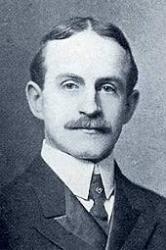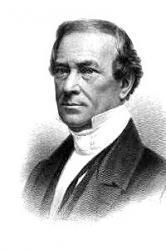
1788 - 1850 Person Name: A. Judson Author of "The Lord's Prayer" in Primary School Carols Adoniram Judson MA DD USA 1788-1850. Born at Malden, MA, his father being a Congregational pastor. He graduated from Brown University, Providence, RI, in 1807 and opened a school. He wrote an English grammar and mathematics textbook for girls. He then attended Andover Theological Seminary. studying Hebrew, Greek, and Latin. His friend, Jacob Eames, turned him from religion, but Eames died suddenly, and he Judson, shocked, turned back to God in 1808. In 1809 he became interested in missions. In 1810 he was licensed to preach by the Orange Vermont Congregational Association, preparatory to pastoral ministry. However, he had inclinations to overseas ministry, and, having failed to get an appointment from the London Missionary Society, persuaded the American Board of Commissioners for Foreign Missions (ACBFM), to send him and his wife, Ann Hasaltine, and six others, as Baptist missionaries to India. They departed in 1812 on a 4-month voyage to Calcutta. Enroute, Ann miscarried their first child. Arriving there, having studied Baptist principles enroute, they decided to be baptized. They were, and they resigned from ABCFM, laying plans for creation of a Baptist Missionary society from the U.S. After experiencing various hindrances from the East India Company, they escaped India, and began mission work in Rangoon, Burma (now Myanmar) in 1813, becoming the first mission of American Baptists (where Judson labored for almost 40 years). They spent three years learning the Burmese language with the help of a tutor. They evangelized and did Bible translation. They spent 12 years making 18 converts from Buddhism. In 1817 a printing press came from America and a printer, George Hough, and his wife. They printed the first Christian tracts in the Burmese language, including 800 copies of the book of Matthew, translated into Burmese by Judson. That helped in gaining converts. In 1824, Rangoon having been taken by the British, Dr. Judson was charged with being a British spy and was held captive by the natives until the Burmese capitulated to the British in 1826. Thanks to his sickly wife’s efforts he was released after 21 months in squalid prison conditions, and was pressed to serve as a translator for the Burmese government during negotiations for the Treaty Yandobo. His wife died that year from complications of smallpox. In 1828 he moved his mission efforts to Moulmein, where, with help from a Jonathan Wade, he built a church and school and continued work on the Burmese Bible. He married Sarah Hall Boardman, widow of his late colleague, G D Boardman, who died at sea. She was a gifted linguist and teacher. He finished translating the Burmese Bible, after 24 years, in 1834, and he and wrote several tracts in that language. After the birth of her 8th child (most with her former husband), Sarah’s health declined, and they embarked for the U.S. She died enroute. He completed the trip and remained on furlough for nine months. He suffered from laryngitis due to pulmonary illness, and reduced strength, but was hailed a hero throughout the Christian community. When he talked, he had to use someone who could repeat his words in order to be heard above a whisper. While at Madison University in upstate NY, he met and married Emily Chubbock, a writer and educator. They returned to Burma in 1846 to continue work on an enlarged Burmese dictionary. It was compiled in 1849. Shortly thereafter, he contracted a respiratory fever and, while attempting to travel to a better climate for his health, died at sea in the Bay of Bengal. Most of their children died in infancy or when young. His legacy included establishing 100 churches, 8000 believers, and encouraging more missionaries to come to Burma after him, Sarah Cummings, Jason Tuma, and Eleanor Macomber, to name a few. His memoirs were published in 1853. He also wrote some hymns. Because of his efforts, Myanmar has the 3rd largest population of Baptist Christians in the world, behind the U.S. and India. Each July there is a Judson Day in Myanmar. Accolades given and institutions and organizations named after Judson in both Myanmar and America are too numerous to name here, but one can look them up.
John Perry
============
Judson, Adoniram, D.D., born at Maldon, Massachusetts, Aug. 9, 1788, where his father was Pastor of a Baptist Church. He graduated at Brown University, Providence, Rhode Island, 1807; and went in 1815, together with his first wife, as a Missionary to India. After encountering various hindrances from the East India Company, they began their mission in Burma. On June 8, 1824, Rangoon having been taken by the British, Dr. Judson was imprisoned by the natives, and was kept in captivity until the Burmese capitulated to the British in 1826. His first wife dying on Oct. 24, 1826, he married the widow of his late colleague, G. D. Boardman (ne'e Hull, April 10, 1834. He died at sea, April 12, 1850, and was buried in the deep. He translated the Bible into Burmese, and wrote several tracts in that language. A Burmese-English Dictionary was compiled from his papers. His Memoirs, by Dr. Wayland, were published in 1853. His hymns include :—
1. Our Father God, [Lord] Who art in heaven. The Lord's Prayer. This hymn is dated "Prison, Ava, March 1825," and was written during his imprisonment. It was given in his Memoirs, 1853, vol. i. p. 308. It is in common use in Great Britain and America.
2. Our Saviour bowed beneath the wave. Holy Baptism. This dates from 1829, or earlier, and is in 7 stanzas, It is said to have been "sung at the Baptism of several soldiers at Moulmein, British Pegu." St. i.-iii. usually form the hymn.
3. Come, Holy Spirit, Dove divine. Holy Baptism. This is composed of st. vii., v., vi. of No. 2, and is found in Winchell's Collection, 1832. [Rev. F. M. Bird, M.A.]
-- John Julian, Dictionary of Hymnology (1907)
Adoniram Judson


 My Starred Hymns
My Starred Hymns






